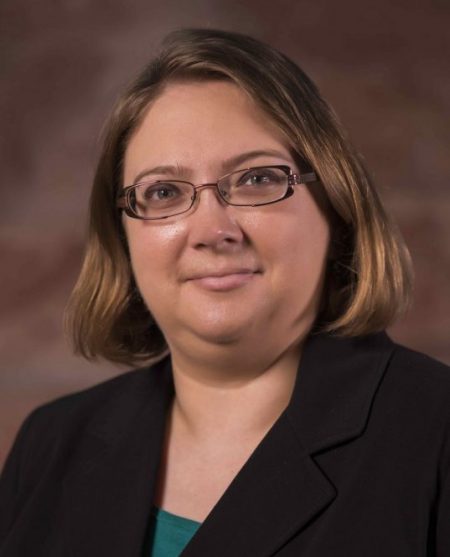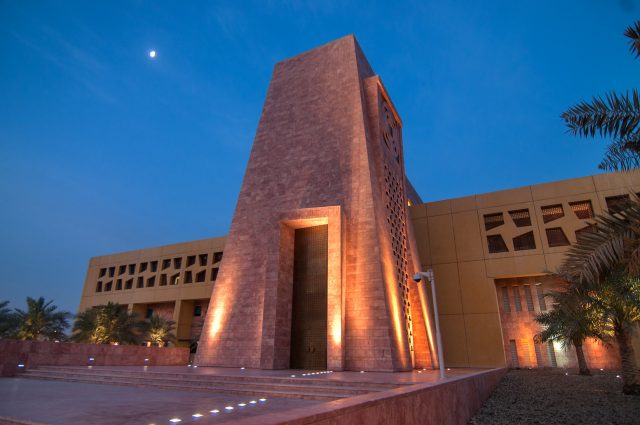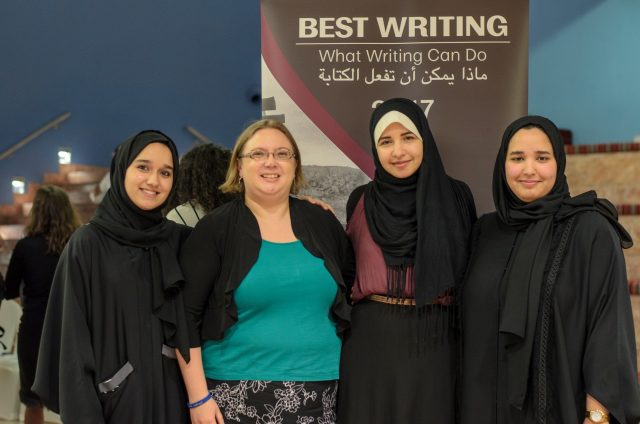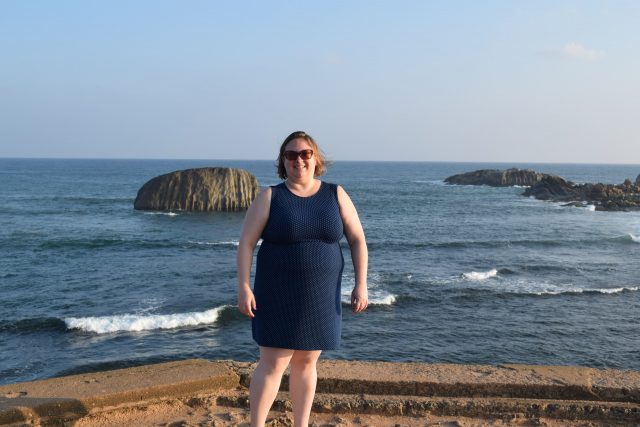Planning to Pursue an International Career?
Alum Amy Hodges Talks about Her Experiences Working Abroad

Amy Hodges (Ph.D. ’12) may currently be located farther away from the U.S. than any other English doctoral alum from the University of Arkansas. (And if anyone reading this would dispute that statement, please let me know!) Since graduating from our doctoral program, Amy has worked in Qatar and Singapore. She continues to teach at the Texas A&M University at Qatar as both an Instructional Assistant Professor in the Liberal Arts Program and also the campus’s Writing Across the Curriculum Coordinator. We recently caught up with Amy to ask if she could offer feedback on a number of issues related to pursuing an international career with a graduate degree in English. She generously sent back wonderfully detailed, helpful responses as well as several pictures from her travels. Current graduate students reading this blog profile can better understand the many benefits along with the real challenges involved in pursuing a career abroad and with an institution situated within a cultural context quite different from Arkansas’s. And for you alumni currently working at jobs within domestic academic institutions – after reading this, you might consider the possibility of redirecting your professional aspirations toward teaching, publishing, advising, and/or administrating from somewhere overseas!
First, Amy, let me confirm the focus of your doctoral specialization and your dissertation project, “Performing Literacy: How Women Read the World in Late Eighteenth-Century British Novels.” Your main area of doctoral study was Eighteenth-Century British Literature, but you also completed the Secondary Emphasis (now referred to in the graduate catalog as a “Focused Study”) in Rhetoric and Composition, is that correct? The title of your dissertation indicates a combination of these interests in both literary study and rhetoric and composition studies. Could you talk about why you decided to bring those interests together in your dissertation and how easy (or difficult) it was for you to accomplish that?
Scholarship in rhetoric and composition, particularly reading theory and literacy studies, gave me a language for what I was seeing – but couldn’t articulate – in the novels I was reading for my literature courses. I was curious about what exactly happens when we read, as well as how that reading experience impacts our perceptions of others. Given the attention that reading gets from both fields, literature and rhet/comp seemed like a natural pairing for my dissertation.
That’s not to say it was always easy, as I felt like I had to have twice the number of citations! Also, I had my doubts about how this work might fit (or not fit) journals in the field. I published one book chapter from my dissertation, but I haven’t touched it since. I don’t mean to discourage anyone from taking a similar path, as I could have worked harder at finding my niche. I just realized my passion and my strengths were elsewhere.
What I took away from that experience was the richness of working at intersections. My work now draws from composition, second language writing, WAC/WID, and writing program administration, among others. I like to see scholarship that reflects the complexity of the communities we live and work in.
You completed your M.A. at the University of Arkansas in 2007 and your Ph.D. here in 2013. Not long after completing your Ph.D., you started teaching abroad and have been doing that ever since – working first as a postdoctoral associate at Texas A&M University at Qatar (2013-2015), next as a postdoctoral associate at MIT/Singapore University of Design and Technology (2015-2016), and then as an instructional assistant professor back at Texas A&M University at Qatar (2016 to present). Had you always been planning, while completing your doctoral studies, to teach overseas? What drew you in that direction? Could you talk a little about the process of applying and interviewing for jobs in other countries to give some guidance to our current graduate students who might want to follow a similar professional path? What is the best way to find out about these opportunities, and what are some key issues that applicants should consider before going on the international job market?
I didn’t even have a passport before coming to Qatar, so I definitely wasn’t planning to live overseas!
While I was at the U of A, I was drawn to working with diverse writers: ESL students at Spring International Language Center, Hispanic sixth-graders at Razorback Writers, and the variety of graduate students and undergraduates across the curriculum at the Quality Writing Center. I knew that one of the things I wanted to do was increase opportunities for underserved populations to succeed at university-level writing. So the idea of working with an international population was very appealing to me.
What happened was that Leslie Seawright called and offered me a postdoc position working for her and another faculty member at TAMUQ. At the time, I was working four jobs, was weathering a major health crisis, and was teetering precariously near the poverty line. It seemed like a good time as any to take a risk! Leslie also invited me to go to a conference there, so I felt like I knew enough about what I was getting into.
The TESOL Careers Page and the Transnational Composition Group Facebook Page are good places to start specifically looking for international jobs. Some postings may use a different set of terms that some people might be not used to: EAP, ESP, academic literacies, world Englishes, and applied linguistics. These terms can provide helpful information about what an institution might know or not know about some of the items on my CV. For example, WAC is not a common acronym in British-influenced institutions, so I might do a little extra explaining in my cover letter.
Now that I’m on the other side of the table, I realize that a lot of the questions at my interviews were really about how I adapt to new situations. A new hire means a ton of government paperwork and a lot of money in terms of salary and benefits (housing and airfare is included in some international jobs). You don’t want to take a chance with someone who will want to leave in three weeks.
So after I had one international experience, I was very competitive on the market for others. I think that even something like a study abroad would be helpful for job candidates to emphasize. Committees were very interested in my writing center and faculty development experience – depending on the institution, writing support outside the English department may be very new or understaffed, so they saw me as someone who could collaborate with a current center or start one up.
That said, I went into these interviews with my eyes wide open. I was in the pool for a tenure-track job near a current warzone, and at the end of the interview I asked about the situation on the ground and faculty members’ perception of their safety. I didn’t get that job, and have no way of knowing if my question was a deciding factor, but I felt good about asking it. Another university offered me a position after one Skype interview, and when I asked for a campus visit before deciding, they hemmed and hawed. I turned that one down after talking to a colleague in the area who thought that the university just wanted some warm bodies to teach English.

How does teaching abroad compare with teaching in the U.S.? What were some ways that you had to adjust, as an academic, to meeting the unique cultural standards and expectations in both Qatar and Singapore?
I think that the adjustment has been in creating a level playing field for all students, regardless of their language background. I mean, some of my first-year students say that 250 words on the importance of breakfast was the longest essay they’ve ever written in English. Is that student going to meet my internalized standard for what an American first-year writing student should be able to do? Would making that student meet that standard be helpful in her future work as an engineer in a multinational corporation in the Middle East?
Teaching overseas has helped me see the biases I brought with me as a white, American, and privileged native speaker of English. I teach Yemeni students who worry about their relatives surviving the next cholera outbreak, Palestinians who have never been allowed in their homeland, Chinese students who are still processing the trauma of their intensive high school education, young women whose families disapprove of their career choices, Qataris who are richer than I have been or ever will be – and that’s just the facets of their lives which I have time and space to share here. Will all of these students ever be able to put the comma in the right place for APA citations or format their reference page correctly? No.
And who really cares? We’re almost at the end of the semester, and just the other day my students were workshopping their drafts for the final assignment. One told me about her plan for organizing her paper; it showed that she’d studied the genre conventions and it made a lot more sense than the other organizational methods she used at the beginning of the course. Another called me over to ask about a phrase she’d underlined; she asked me for another way to say it, and before I could answer she supplied a suitable replacement. These are writers who take command of their own words and who aren’t intimidated by challenging assignments. That’s what I’m aiming for, and if we can make the time to get their subjects and verbs to agree, well that’s just a bonus.
As far as adjusting as an academic, you can see that some of my views above are a bit controversial, and they’re not shared by everyone who teaches English, even within my own department. Probably wherever I went, I’d have to figure out when to speak up and when to listen to my colleagues who have different personal and professional backgrounds. I’ve also discovered how academic bureaucracies work in three different cultures, but I’m not sure that’s such an exciting finding!

Amy with Three of Her Students: (from left to right) Jowaher al-Shiba,
Hadear Hassan, and Aisha al-Naemi
Okay, so I peeked at your CV. (Hope that’s okay.) Your background is wonderfully diverse, ranging from your teaching (while still at the U of A) a Comp II Special Topics course on the Twilight series (and its relationship with 19th-century Gothic literature like Austen’s Northanger Abbey); to your starting up a writing and communications center while you were in Singapore; to your teaching first-year writing as well as directing Writing Across the Curriculum and STEAM (Science, Technology, Engineering, Arts, and Mathematics) initiatives in Qatar! You’ve also been publishing articles and started editing collections. (Whew!) One person I know you’ve continued to collaborate with is fellow alum Leslie Seawright (Ph.D. ’12). Can you discuss the extent to which alumni connections have been helpful to you – professionally, of course, but maybe in other ways – while you’ve been charting your career path as both academic and administrator within international institutions?
Leslie has gone above and beyond the call of duty, both personally and professionally. I would not be here in this place today without her, and I am content to ride the wake of her awesomeness and read her new book which just came out from the CCCC Studies in Writing and Rhetoric series.
All the alumni I’m in contact with have been incredibly generous, not only with their time and resources, but with the networks they have access to. Probably because of the diversity of my experience and interests, I’m always having to train myself on something new. I’m a bit of an introvert, so I like knowing that I can approach a significant voice in the field because we have mutual friends. You can’t swing a cat at 4Cs or CWPA without finding someone who knows David Jolliffe.
I truly believe in the saying that a rising tide lifts all boats. I benefit from U of A graduates (like the ones you have previously interviewed on this blog) going out into the world and doing great things. I don’t know many people left in the program, so I hope the current graduate students feel free to reach out to alumni with questions. I’m on Facebook and Twitter, and if I can’t help I’ll put you in touch with someone who can. I’m also presenting at 4Cs this year, and there’s always a group of us that meet up for coffee. We would love to see some new faces.
Where do you see yourself being in five years, professionally and/or geographically?
I hope that in five years, I’ve built a transnational writing program which is an emerging leader in socially just education for multilingual writers. If I’m really on the ball, I’ve written something significant about that experience. Maybe in five years, everyone at my institution will be moderately happy with me. (People tease me about this, but I’m seriously on a mission to make everyone in the world be happy with me. One of my big challenges as a WPA [writing program administrator] is telling people about bad news.)
I’ll still be a world traveler, but I’m on the fence about working in the US or not.
I can’t imagine that you have a whole lot of free time, Amy, but I still want to ask: What do you like to do for fun in Doha (Qatar), and, if you are able to do much traveling on your own (during your semester breaks), where do you like to go, and why?
Fun in Doha means dune-bashing (somewhat dangerous driving over sand dunes in a Land Cruiser), learning how to make a desert-friendly garden on my balcony, going to the beach during the winter months, and just hanging out and smoking shisha (flavored tobacco which is terrible for your lungs, so insert surgeon general’s warning here and no, Mama, I don’t smoke it that often). I also have mad karaoke skills.
I’ve been able to combine work with play and present at conferences in New Zealand, Hong Kong, Japan, and Turkey. And if any readers are interested in going to an academic conference in this part of the world, I highly recommend MENAWCA 2018, which will be held in Al Ain, United Arab Emirates. That’s the Middle East-North Africa Writing Center Alliance, which is an affiliate of IWCA [International Writing Centers Association].
In my free time, I’ve had the opportunity to visit a lot of amazing countries in the region (United Arab Emirates, Oman, Jordan, Israel, Palestine), and I recently spent a long weekend in Sri Lanka. My favorite city in the world so far is Istanbul – I love the diverse influences on Turkish culture. My next life goals are to visit Egypt, Pakistan, Lebanon, Spain, South Korea, Ethiopia, Sweden … the list just keeps getting longer.

Amy Recently Vacationing in Galle, Sri Lanka
